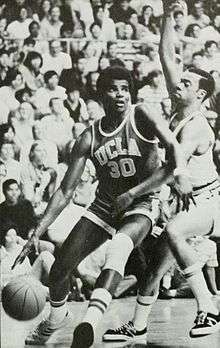Curtis Rowe
Curtis Rowe, Jr. (born July 2, 1949) is an American retired basketball player.
 Rowe from 1971 UCLA yearbook | |
| Personal information | |
|---|---|
| Born | July 2, 1949 Bessemer, Alabama |
| Nationality | American |
| Listed height | 6 ft 7 in (2.01 m) |
| Listed weight | 225 lb (102 kg) |
| Career information | |
| High school | John C. Fremont (Los Angeles, California) |
| College | UCLA (1968–1971) |
| NBA draft | 1971 / Round: 1 / Pick: 11th overall |
| Selected by the Detroit Pistons | |
| Playing career | 1971–1979 |
| Position | Power forward |
| Number | 18, 41 |
| Career history | |
| 1971–1976 | Detroit Pistons |
| 1976–1979 | Boston Celtics |
| Career highlights and awards | |
| |
| Career NBA statistics | |
| Points | 6,873 (11.6 ppg) |
| Rebounds | 4,264 (7.2 rpg) |
| Assists | 932 (1.6 apg) |
| Stats at Basketball-Reference.com | |
A 6'7" forward from UCLA, Rowe was drafted by the Dallas Chaparrals in the 1971 ABA Draft and by the Detroit Pistons in the first round of the 1971 NBA Draft.[1] Rowe opted to sign with Detroit and the NBA.
Rowe played eight seasons (1971–1979) in the National Basketball Association as a member of the Detroit Pistons and the Boston Celtics. He averaged 11.6 points per game in his career and appeared in the 1976 NBA All-Star Game.
At UCLA, he was a member of three national championship teams coached by John Wooden: 1969, 1970 and 1971. He was one of only 4 players to have started on 3 NCAA championship teams; the others were all teammates at UCLA: Lew Alcindor, Henry Bibby and Lynn Shackelford.
In 1993 Rowe was inducted to the UCLA Athletic Hall of Fame.
NBA career statistics
| GP | Games played | GS | Games started | MPG | Minutes per game |
| FG% | Field goal percentage | 3P% | 3-point field goal percentage | FT% | Free throw percentage |
| RPG | Rebounds per game | APG | Assists per game | SPG | Steals per game |
| BPG | Blocks per game | PPG | Points per game | Bold | Career high |
Regular season
| Year | Team | GP | MPG | FG% | FT% | RPG | APG | STL | BLK | PPG |
|---|---|---|---|---|---|---|---|---|---|---|
| 1971–72 | Detroit | 82 | 32.5 | .460 | .669 | 8.5 | 1.2 | – | – | 11.3 |
| 1972–73 | Detroit | 81 | 37.1 | .519 | .642 | 9.4 | 2.1 | – | – | 16.1 |
| 1973–74 | Detroit | 82 | 30.5 | .494 | .698 | 6.3 | 1.7 | .6 | .4 | 10.7 |
| 1974–75 | Detroit | 82 | 34.0 | .483 | .753 | 7.1 | 1.5 | .6 | .5 | 12.4 |
| 1975–76 | Detroit | 80 | 37.5 | .468 | .737 | 8.7 | 2.3 | .6 | .6 | 16.0 |
| 1976–77 | Boston | 79 | 27.7 | .498 | .708 | 7.1 | 1.4 | .3 | .6 | 10.1 |
| 1977–78 | Boston | 51 | 17.9 | .451 | .742 | 4.0 | .9 | .3 | .2 | 6.1 |
| 1978–79 | Boston | 53 | 23.1 | .436 | .693 | 4.6 | 1.3 | .3 | .2 | 6.7 |
| Career | 590 | 31.0 | .482 | .701 | 7.2 | 1.6 | .5 | .5 | 11.6 | |
| All-Star | 1 | 8.0 | .000 | .500 | 2.0 | .0 | – | – | 1.0 | |
Playoffs
| Year | Team | GP | MPG | FG% | FT% | RPG | APG | STL | BLK | PPG |
|---|---|---|---|---|---|---|---|---|---|---|
| 1974 | Detroit | 7 | 32.7 | .481 | .615 | 7.4 | 1.6 | .4 | .9 | 8.3 |
| 1975 | Detroit | 3 | 38.3 | .515 | .526 | 8.7 | 5.0 | .3 | 1.7 | 14.7 |
| 1976 | Detroit | 9 | 38.4 | .477 | .853 | 7.8 | 2.9 | .7 | .9 | 15.0 |
| 1977 | Boston | 9 | 26.3 | .471 | .759 | 8.0 | 1.1 | .1 | .4 | 9.6 |
| Career | 28 | 33.1 | .481 | .726 | 7.9 | 2.2 | .4 | .8 | 11.5 | |
References
- DatabaseBasketball.com Curtis Rowe page Archived November 9, 2007, at the Wayback Machine